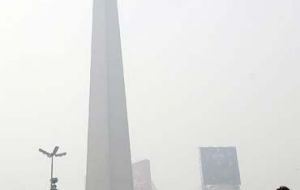MercoPress. South Atlantic News Agency
Spontaneous rallies surprise Kirchner and acolytes
 At the Obelisk like all over the country thousands people banging pans against the government
At the Obelisk like all over the country thousands people banging pans against the government Thousands of Argentines on Monday evening spontaneously and peacefully took to the streets in cities, towns and villages banging pans to protest against the government and demand the resumption of dialogue with the farmers, on their 97th day of conflict.
In Buenos Aires the capital thousands from different quarters of the city marched for a huge concentration at the foot of the obelisk located in what is considered the widest avenue in the world, 9 de Julio. Similar scenes with pans, horns, whistles, clapping and thousands of Argentine flags could be seen screened by television from all over the country. Farmers are calling for a dialogue to discuss basically sliding export levies on grains and oilseeds which were raised last March and currently for soybeans have reached 49%. But camp leaders have also said they want to discuss the overall agriculture policy which includes, beef, dairy, grains, small farmers and the redistribution of taxes collected in the farm provinces. The conflict and over 300 road blocks have caused serious food and fuel shortages further aggravated by a strike of grain truckers also calling for an immediate resumption of talks between the camp and government. Although there has been no official reaction from the administration of President Cristina Fernandez de Kirchner to the latest marches, contrary to what happened on Saturday when the former president Nestor Kirchner and several cabinet ministers surrounded by brown shirts walked among friendly supporters in the emblematic Plaza de Mayo, political leaders from the ruling coalition are beginning to take distance from the hard line approach to the conflict. According to media reports in Buenos Aires several members of Congress are prepared to discuss the controversial sliding export levies with members of the opposition in a formal legislative session, and a huge concentration which had been programmed for next Wednesday could be off. Governors, mayors, council members aligned with Mrs. Kirchner admittedly were surprised that in their own turfs people spontaneously joined the protest in support of the camp and demand government flexibility and common sense. This is a rare phenomenon because the so called K (Kirchner) mayors have the sufficient cash to finance pickets, unemployed and support favors. Apparently three main positions have been identified. The primate response from the brown shirts or riot pickets that have been before used to scare away with sticks and iron bars peaceful demonstrators who openly support the big political rally in Plaza de Mayo on Wednesday. The rally is an attempt to show protestors and camp sympathizers that the government can convene greater support. A second position is that of the trade unions who are willing to declare a four hours stoppage as of mid day to give workers the opportunity to join the political march and rally. Finally the political wing made up of members of Congress, governors, mayors, elected members who feel such a demonstration would only fuel more frustration and disappointment with the government from middle class Argentina. Evidently the political wing is breaking away from the rigid stance of Mr. Kirchner, the "general" behind the strategy that "we will not accept but complete surrender from the camp" and "I want to see them come on their knees pleading for mercy". This in itself if it proves correct, is the big news because it means the Kirchner unbending hegemony is being questioned and pushed aside y his own party. This certainly would be bad news for the Kirchners model of leadership and their arrogant style. But a relief for Argentina and all the problems that have been accumulated for several years insisting with unorthodox economic policies, basically subsidies financed with the windfall earnings from the camp and the country's once abundant (now depleted) energy resources.




Top Comments
Disclaimer & comment rulesCommenting for this story is now closed.
If you have a Facebook account, become a fan and comment on our Facebook Page!